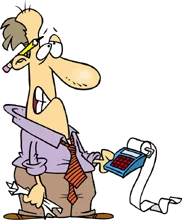Cash Receipts Controls
Cash Controls

- Establish procedures for handling cash and insuring that all cash is properly accounted for and timely deposited in your bank.
- Capture and Record the receipt of cash ASAP (as quickly as possible) using cash register or computer terminal receipts, credit card machine, receipt book, or a log listing the checks received.
- Endorse all checks received immediately as FOR DEPOSIT ONLY with a stamp.
- Duties:
- Individuals who handle and/or collect the cash (has temporary custody or access to cash and/or checks) should not also prepare sales invoices, and/or record or have access to the journals and detail customer accounts used to record the cash receipts.
- Individuals who prepare the deposit slip and make the bank deposit should not prepare sales invoices, and/or collect cash, and/or record or have access to the journals and detail customer accounts used to record the cash receipts.
- Make daily bank deposits and deposit your receipts intact (don't pay bills with cash out of your cash receipts). in order to reduce the risk of money being lost or stolen. Use your petty cash fund to pay expenses or advances that require currency. You should not keep large quantities of cash on your premises. If you need cash (currency) for a specific purpose go to the bank and cash a check when it is needed.
- Credit Cards
If you accept credit cards for payments you will also need to monitor and record these transactions. No deposit slip is prepared for this type of transaction. These receipts are directly deposited into your account and you need to provide procedures for recording and tracking these "special" receipts.
- Balance Your Cash Drawers/Registers
Believe it or not I've done work for some small businesses that did not want to fool with the "hassle" of balancing their cash drawers/registers. Oh gosh how tempting. Employees are not dumb and are fairly observant. As I've already stated, most people are basically honest but why put them in a tempting position. We also tend to rationalize-I need a little gas money so I'll borrow it from the register and put it back later. Most of us don't mind helping out but I want to be asked. Count your registers/drawers and balance them daily. If you don't want to do it yourself assign a trustworthy person the task and periodically check them. If you need to close up put the cash and checks in a money bag and do your count the first thing the next morning.
It's a lot easier to find and fix a mistake today than it is at the end of the month. It's also a lot easier to balance.
- Set Up Procedures For Handling Returned Checks
Many banks will run a customer's check twice in order to try collect the funds and credit them to your account. In the event that they are unsuccessful your customer's check is returned to you. You need to have a procedure in place and an individual designated to promptly follow up on these returned checks. If the check is local and the endorsement has not been canceled by the bank one good method is to call the bank that the check is drawn on and see if the check is good.Good days to make a call are Friday and Monday since many companies pay their employees on Friday. If the account has a balance large enough to cover your check high tail it over to the bank and get it cashed. If the endorsement has been canceled or the check is non-local, you need to immediately call the customer and make arrangements for them to make the heck "good" and pay any additional check processing fees that are stated in your policies.
Writing a bad check in today's society is a serious offense and if prosecuted may result in fines and jail time. Don't leave your bad checks just laying around collecting dust. Take immediate action and get your money. You should also review the current status of this customer's account such as open orders and current balance and late amounts to see if additional actions such as halting shipments, a credit hold, or COD terms are needed.
- Spot checks should be made to see that the amount deposited in the bank agrees with the deposit slips, the amounts recorded in the cash receipts journal, and the amounts initially recorded in the Daily Receipts Log.

What's next ?
Cash Payments Controls
